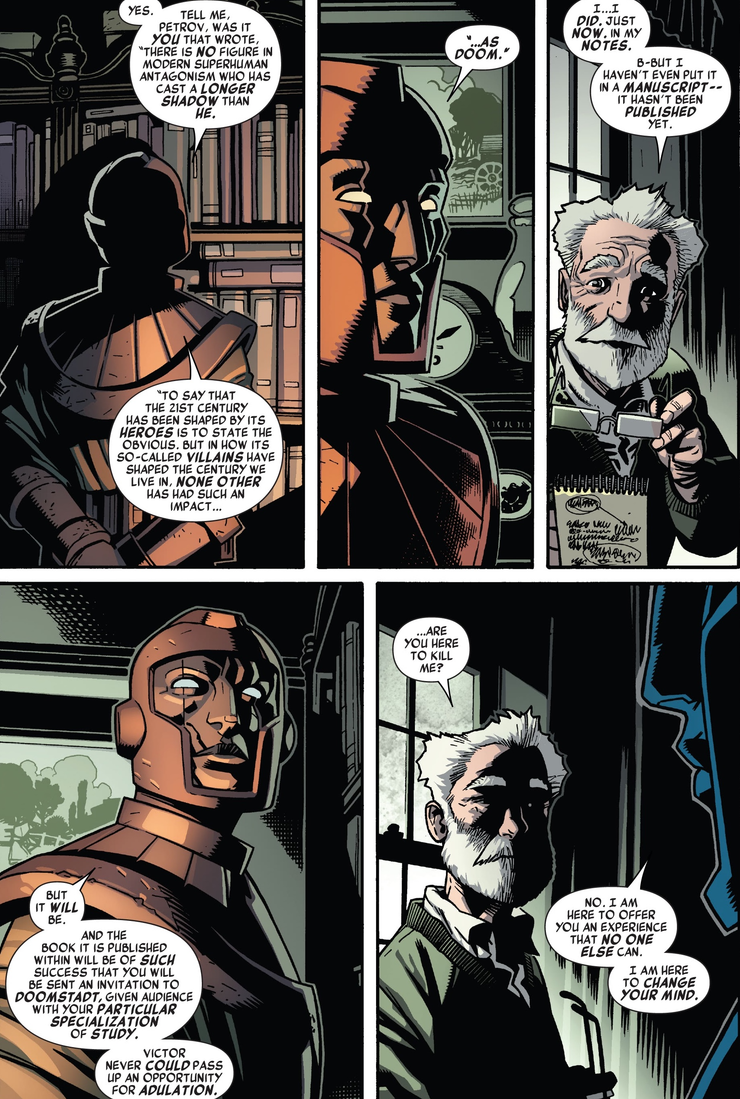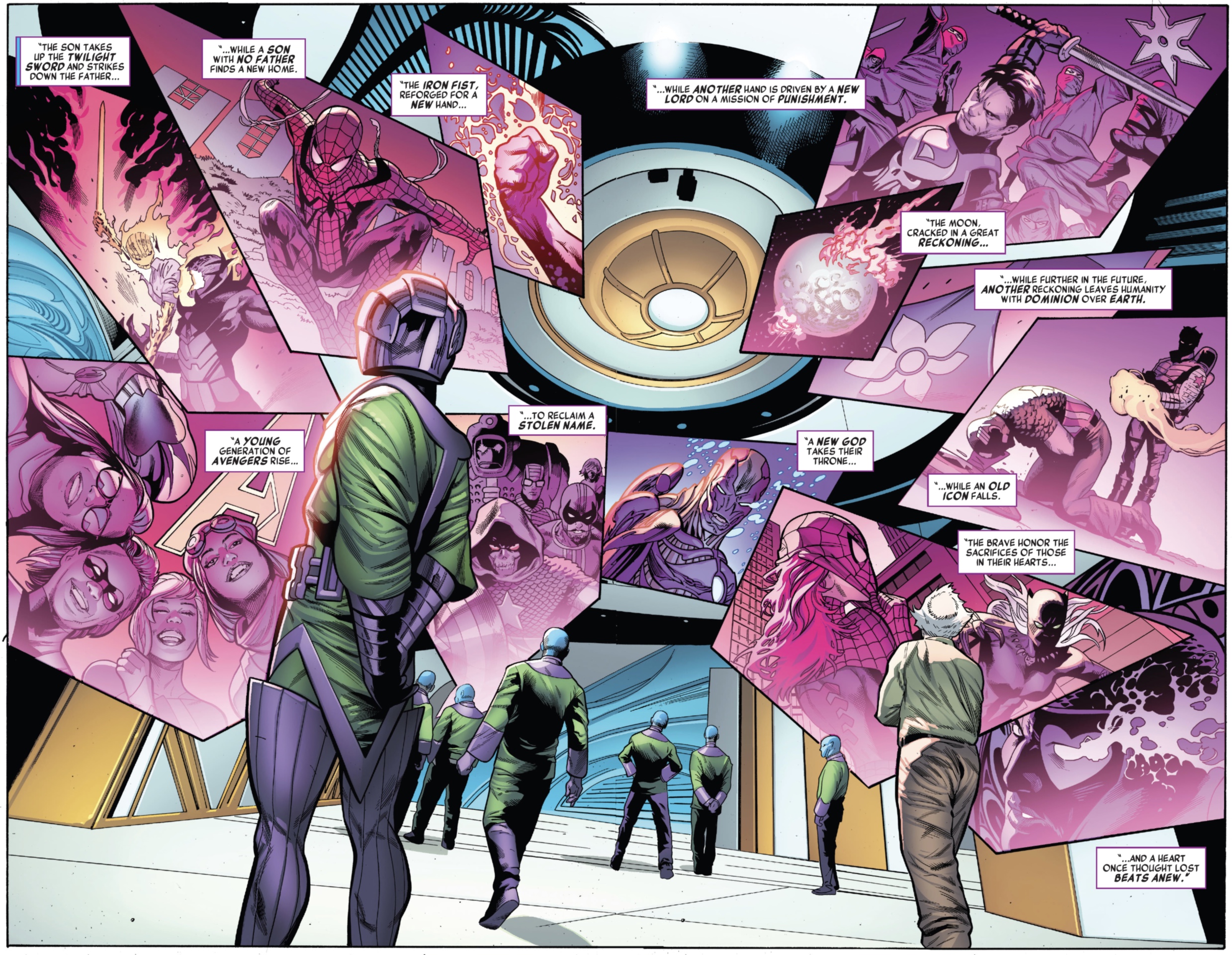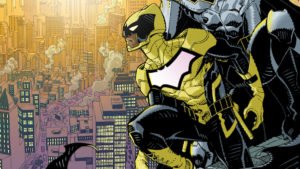Writer: Jed MacKay
Artists: Kev Walker, Greg Land, Jay Leisten, Mark Bagley, Andrew Henessey
Marvel Comics, February 2022
Evergreen Avengers‘ antagonist Kang is not a character your reviewer is overly familiar with. On the face of it, Kang is a time-travelling supervillain, causing trouble in various eras, and repeatedly provoking American comic book publisher Marvel Comics’ superheroes to tangle with him and foil his plans. There are many of these sorts of time-machine enabled villains floating around amongst the American major publishers – DC Comics has the omnipotent Time Trapper and the frustrated would-be tyrant Per Degaton, while Marvel has the curiously-hatted Immortus and a cyborg antihero named Deathlok.
There is a sense with Kang that even when defeated, it was always part of some sort of long range plan. Kang has the benefit of knowing the present as history, and as writers try to maintain the mystique, his machinations come across as obscure. That smarmy “I’m not really beaten – you’re just not clever enough to understand what I am up to” narrative from writers about a variety of evil geniuses in American superhero comic books is tiresome.

Timeless, though, gives the reader some intimacy into Kang. In this tale, Kang is affronted with an academic named Anatoly Petrov of the Lomonosov Moscow State University writes about the Fantastic Four’s arch-nemesis Dr Doom as the most influential of all of Marvel Comics’ super-villains. Ego compels Kang to intervene in this assessment. Kang provides Petrov with first-hand insight into Kang’s life and motivations. Here is the promotional spiel:
HOW DO YOU WIN A WAR AGAINST TIME? A special year-ending adventure that gives portents as to what is to come in the Marvel Universe over the next twelve months! Kang the Conqueror is a warrior, a destroyer, a subjugator—but even he is subject to the whims and vicissitudes of time itself. So when a parallel timeline threatens to overwrite the future Kang has fought so long and so hard to control, the master of the ages has no choice but to go to war with time itself, battling through days of tomorrow as he struggles to prevent the end of what is to come! Featuring all the major players in the Marvel pantheon!
Kang clearly has no compunction about changing history even if for the mere purpose of correcting a slight. This is at odds with many other characters at Marvel Comics, who go way out of their way to “preserve the time stream” (maintain the integrity of history and avoid butterfly effects). Kang treats time with a cavalier disregard of the consequences of mucking about with it.

We have often seen Kang in various Marvel Comics as first and foremost an adventurer, who seeks to challenge himself with danger and excitement. In Timeless, however, Kang, as a human with omnipotent power to go when he pleases and with the benefit of unbeatable combat training, almost seems a bit lost for purpose. Whether it is hunting a woolly mammoth for sport or battling a brigade of Deathloks, Kang dispatches his adversaries unparalleled skill. And so, Kang is excited when something unexpected and potentially dangerous occurs in the time stream, and off he goes, dragging the hapless Petrov with him.

In Neil Gaiman’s The Sandman (published by Vertigo Comics and now republished by DC Black Label), an immortal avatar named Dream of the Endless suffers from a similar sort of ennui. Both Dream and Kang are conscious of the brief lives of ordinary humans. Dream disregards human life as ephemeral. Kang takes a slightly different view. He celebrates the survival of the species but disregards the individuals within the species. It is callous. The prehistoric tribe who he feeds with the kill of the mammoth and who worship him as a god are reduced to skulls through the effluxion of time, and Kang takes no notice. Even his trained minions are completely replaceable. Petrov is only special to Kang because Petrov judged Kang’s impact upon the 20th century incorrectly. History, and Kang’s role in it, is more important to Kang that the lives of the individual.
One of the special insights from the 1993 movie Groundhog Day is that, faced with immortality and omniscience over that one day in that one town of Punxsutawney, the main character Phil Connors (played by Bill Murray) comes to realise that self-indulgence has limits. Eventually, Connors realises that it is nice to be good just for the sake of doing good. Kang is very far away from that. The thirst for adventure does not hide the fact that, at the end of the day, Kang is an emotionally-stunted narcissist. One wonders what the Petrov’s re-write of his text would look like after his day with Kang.
This is a highly entertaining story from writer Jed MacKay and the large team of artists. Kang has now appeared (in an almost unrecognisable form) in the Marvel cinematic universe courtesy of the recent Loki television miniseries. No doubt we will see much more of the character both in comics and in theatres over the next few years.

